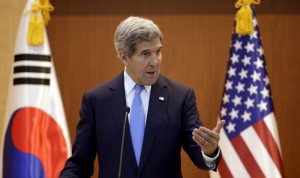- California Assembly OKs highest minimum wage in nation
- S. Korea unveils first graphic cigarette warnings
- US joins with South Korea, Japan in bid to deter North Korea
- LPGA golfer Chun In-gee finally back in action
- S. Korea won’t be top seed in final World Cup qualification round
- US men’s soccer misses 2nd straight Olympics
- US back on track in qualifying with 4-0 win over Guatemala
- High-intensity workout injuries spawn cottage industry
- CDC expands range of Zika mosquitoes into parts of Northeast
- Who knew? ‘The Walking Dead’ is helping families connect
Kerry says Iran nuclear deal grew out of failure with N. Korea

U.S. Secretary of State John Kerry answers a reporter’s question during a joint news conference following meetings with South Korean Foreign Minister Yun Byung-se at the Foreign Ministry in Seoul, South Korea, Monday, May 18, 2015. (AP Photo/Lee Jin-man, Pool)
WASHINGTON, July 23 (Yonhap) — U.S. Secretary of State John Kerry said Thursday the recent landmark deal on Iran’s nuclear program grew out of “the failure of the North Korea experience.”
Kerry also said that Iran and North Korea are different, defending the Iranian deal during a Senate Foreign Relations committee hearing as Republican senators raised concern the Iranian deal could fall apart like the 1994 nuclear deal with North Korea.
“Iran has also agreed to accept the additional protocol, and the additional protocol is an outgrowth of the failure of the North Korea experience, which put in additional access requirements precisely so that we do know what Iran is doing,” Kerry said.
The 1994 deal with North Korea, known as the Agreed Framework, required North Korea to freeze and ultimately dismantle its nuclear program in exchange for economic and political concessions. But the deal fell apart after the North was found to have been running a secret nuclear program in late 2002.
Kerry stressed that Iran is different from the North.
“Unlike North Korea, that created a nuclear weapon and exploded one and pulled out of the NPT (Nuclear Nonproliferation Treaty), Iran has done none of that,” he said.
The North Korea experience is “what gave birth to the additional protocol” in the Iranian deal, Kerry said.
“The additional protocol came into existence to remedy the deficit of what happened with North Korea. So, the access we have here, we never had in North Korea. We have unprecedented ability to hold Iran accountable,” Kerry said.
“I believe through the myriad of access, civil nuclear program, 24/7 access to their declared facilities, we will know instantaneously if they try to move,” he said.
The six-party talks were launched in 2003 to convince Pyongyang to give up its nuclear program but produced no lasting results. The talks have been suspended since the last session in late 2008.
North Korea has demanded unconditional resumption of negotiations, while the U.S. has maintained that Pyongyang must first take concrete steps demonstrating its commitment to denuclearization.
















